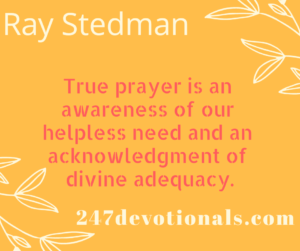Table of Contents
Topic:Conviction Based on God’s Word
So whatever you believe about these things keep between yourself and God. Blessed is the one who does not condemn himself by what he approves.
Romans 14:22

This verse is not saying you are to keep quiet about your liberties, that you do not say anything to anybody, that you keep it between yourself and God. What Paul is saying is, “if you have faith, have it between yourself and God.” Let God’s Word be the basis for your faith, and nothing else. Be sure that what you are doing is not because of pride on your part, because you want to show off how free you are — you are doing this because God has freed you by his Word. If you have really based it on that, then your action will be one in which your conscience is free. You will not feel guilty and troubled as to whether you are acting beyond what the Word of God really says. You will be happy, free, blessed. But, if you do not, if you really have not settled this based on Scripture, but are acting only because you want to indulge yourself; if you like this thing but you still feel a bit troubled by it; if you act then, you are going to be condemned by your conscience. And if you are condemned by your conscience, you will feel guilty. And if you act because you feel guilty, you are not acting out of faith, and, therefore, you are sinning. This is Paul’s argument.
“Without faith,” Hebrews says, “it is impossible to please God,” (Hebrews 11:6a). Faith means believing what God has said. You must base your actions in Christian liberty on what the Word of God declares — not about any specific thing, but the great principle of freedom which is set forth. Now, if you understand that, fine, Paul says. But be sure that you yourself are acting not out of pride, not out of mere self-indulgence, but out of a deep conviction that rests upon the Word and revelation of God.
To sum up, what Paul has said to us is: Do not deliberately stumble or shock your brother or sister. Do not deliberately do things that will offend them, or even make them feel uncomfortable. Think about them, not yourself. Second: Give up your right when it threatens the peace or hinders the growth of another individual. Be alert to judge in that area. Third: Never act from doubt. Act only from conviction, by the Word, and by the Spirit of God. If these problems are all settled on that basis, you will be moving gradually toward the great liberty that we have as children of God.
What will happen in the eyes of the watching world? Christians will be seen to be free people, not controlled by scruples that limit them and narrow them in their enjoyment of God’s great gifts. Yet, these things will not be of such importance that they are put at the heart and center of everything. The world will begin to see that the heart of the Gospel is righteousness and peace and joy in the Holy Spirit, the gifts of God. Those gifts, then, are the basis for freedom in all these areas. But you are just as free to say, “No” to the indulgence of a gift as you are to say “Yes” to it. That is true freedom. You are not free if you think you have won your rights. That is not freedom. Freedom is the right to give up your rights, for good and proper cause. That is what the watching world will begin to see.
Teach me Lord, to walk softly before you in this, with a concern for my brother and sister; to be patient and to learn to enjoy my liberties only as they do not injure or hurt another.
Life Application
What three conclusions summarize God’s Word to us concerning our attitudes and behavior in debatable issues? What is authentic freedom when the issue is our ‘rights’?
